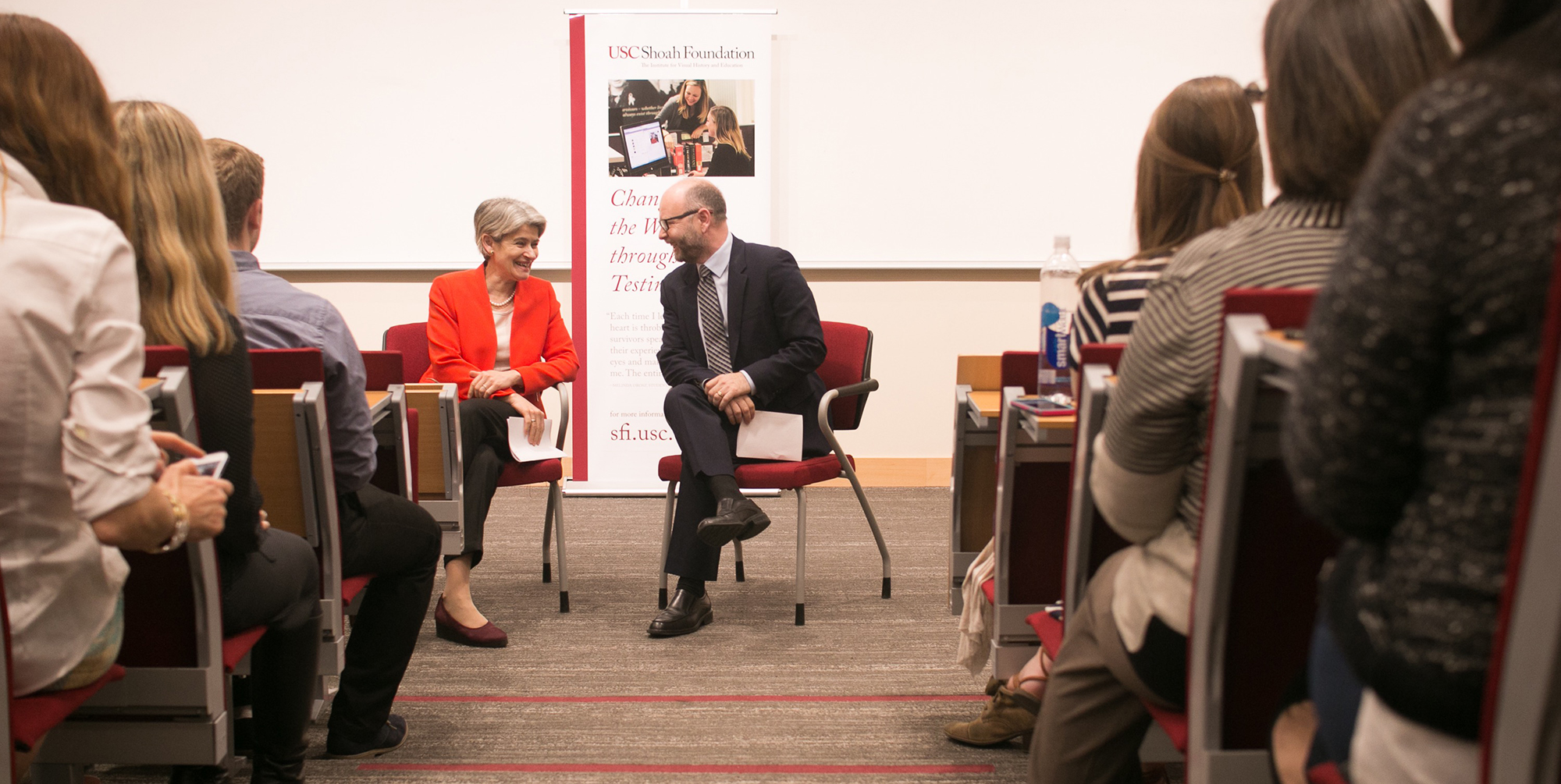UNESCO Director-General Irina Bokova Discusses Education and Preventing Extremism in Conversation with Stephen Smith

Ambassador Irina Bokova, director-general of UNESCO, discussed the importance of human rights education in combating radical extremism around the world in a talk with USC Shoah Foundation Executive Director Stephen Smith on February 8 in Leavey Library.
As Director-General of UNESCO (United Nations Educational, Scientific and Cultural Organization), Bokova leads the charge to use education to counter violent racism and anti-Semitism. She is also chiefly concerned with global gender inequality, worldwide access to quality education, and stopping the illicit sale of cultural artifacts to fund terrorism. Before leading UNESCO, Ambassador Bokova was an elected Bulgarian official, served as the acting Minister of Foreign Affairs and was Bulgaria’s Ambassador to France, to Monaco and to UNESCO.
A leading champion in the fight against racism and anti-Semitism, Bokova has spearheaded UNESCO’s activities on Holocaust remembrance and awareness and is the first Director-General of the Organization to appoint a Special Envoy for Holocaust Education.
Smith holds the UNESCO Chair on Genocide Education to collaborate with genocide researchers and educators around the world to develop educator training and multidisciplinary programs that foster learning about the causes and effects of mass violence. In November, Smith and other USC Shoah Foundation staff joined UN representatives from all over the world at a special meeting on “Preventing Violent Extremism Through Education” during the UNESCO 38th General Conference in Paris.
To begin the discussion, Bokova explained the founding principle of UNESCO: it was created in 1945 as a way to prevent future wars and atrocities through education, intercultural understanding, appreciation of heritage and scientific cooperation.
“Since wars start in the minds of men, it is in the minds of men that the defenses of peace should be built,” Bokova said.
One of UNESCO’s biggest initiatives is the preservation of historical sites through the UNESCO World Heritage List. Bokova said the list is more important now than ever before, since it defies the radical extremist narrative that “pure cultures” exist in the world and they should be imposed on all people. Historical sites like mosques, synagogues and monuments demonstrate that there is no such thing as a completely pure society. Rather, cultures throughout history permeate, add wisdom and build upon the others.
“It is precisely this diversity of humanity that [ISIS and other extremists] want to destroy,” Bokova said. “UNESCO is engaging young people who sometimes fall prey to extremism to show that the truth of history is different from what these extremists want to impose on the world.”
Bokova described some of UNESCO’s most recent achievements in promoting knowledge of diverse cultures and history. It is currently translating its ninth volume of a textbook on the history of Africa, and made sure to include information about the foundations of Islam. UNESCO also founded International Jazz Day to promote American jazz as a positive example of how various cultures from all over the world combined to create a new art form.
In response to Smith’s question about the importance of the Chair on Genocide Education, Bokova said human rights education is the basis of all UNESCO’s work. It is important that education about the Holocaust and other genocides is not simply about looking back at the past but also linking it to the present and learning how to prevent future conflicts. She also noted that one of UNESCO’s goals in combating anti-Semitism and Islamophobia is to help teachers start educating students about these difficult concepts at an early age, particularly in primary school.
The biggest challenge Bokova feels UNESCO faces is how to get governments to not simply declare their commitment to universal values, but actually take action to improve their country’s human rights and tolerance education. She and her colleagues must figure out how to use local arguments and tools in order to “push the buttons” to make such education happen around the world.
“Transforming society is sometimes difficult,” Bokova said. “It takes time. It takes commitment, it takes partnerships, it takes a lot of work to make this happen. It cannot happen overnight; we understand this very well. But you have to work.”
Like this article? Get our e-newsletter.
Be the first to learn about new articles and personal stories like the one you've just read.